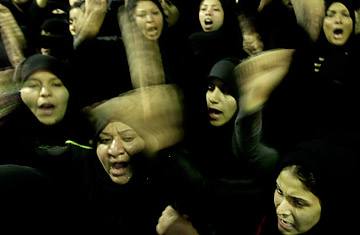
Bahraini Shi'ite antigovernment protesters chant slogans in Manama, Bahrain, on Friday, Feb. 18, 2011
For weeks, Bahrain's Shi'ite-dominated opposition movement felt it had been suffering in a bubble. The occasional condemnation of the Sunni monarchy's repression would emerge from Washington, but little else. But as the regime began razing more Shi'ite mosques (more than 30 in the past three months), thundering words of support came from the very top of the American government. On Thursday, May 19, Barack Obama took on the rulers of the longtime U.S. ally (which plays host to the Fifth Fleet in the gulf), saying, "The only real way forward is for the government and opposition to engage in a dialogue, and you can't have a real dialogue when parts of the peaceful opposition are in jail."
Opposition leaders have criticized the U.S. for what they feel is a soft stance on violence perpetrated by the Bahraini government against activists. "Will the U.S. stop turning a blind eye to repression?" officials of the embattled opposition party al-Wefaq asked in a statement released earlier on Thursday. "Will the U.S. be more assertive in telling its friends the time has come to end repression? Will the U.S. encourage allies in the region to respond to genuine reform calls?"
Obama's remarks heartened opponents of the regime. "Democracy is democracy, and it has to apply to all countries, even those you consider as an ally or friend," says Nabeel Rajab, head of the Bahrain Center for Human Rights. He and other activists applauded the President's reminder that though Bahrain's government has said it is open to dialogue, it has also arrested most of the key opposition leaders who would act as intermediaries. An al-Wefaq official said he was "pleased" that the President had addressed the ongoing violence and hoped it would pave the way for talks between Shi'ite opposition officials and the ruling Sunni government.
Obama's calls for dialogue could strengthen the position of Bahrain's Crown Prince Salman bin Hamad bin Isa al-Khalifa, a reformist who has consistently encouraged talks with antigovernment groups. Al-Khalifa is battling an internal split, with his reformists who call for dialogue losing out to extremists who have backed the vicious crackdowns that have left at least 25 Shi'ite protesters dead and more than 500 missing or in jail. "The Bahrain government's not presenting a united front at present," says Jane Kinninmont, a senior research fellow for the Middle East and North Africa at Chatham House. "It's clear that there are internal divisions. You can see Obama's speech as trying to strengthen the Crown Prince and the reformists in the government against the hard-liners."
For the past few months, Bahrain's government has tried to pass itself off as a reformist party. However, its actions are far from conciliatory toward the opposition. The editor of the chief opposition newspaper, al-Wasat, is due to stand trial in a closed court. Ibrahim Sharif, the president of Bahrain's largest leftist party, has not been seen since a predawn arrest in March.
Meanwhile, Obama's condemnation of the destruction of Shi'ite mosques has left the regime feeling even more isolated. In a statement, Bahrain's Cabinet said it "welcomed" the principles contained in the speech and that the "door for dialogue was open ... and would remain so and hopes that the dialogue witnesses the participation of all to achieve a national consensus through constitutional establishments." Observers believe, however, that the divisions within the Sunni ruling class are likely to harden.
The only comfort the hard-liners in Bahrain can take is that, in his speech, the U.S. President very loudly left one country unmentioned: Saudi Arabia. Saudi troops have been helping Bahrain's security forces crack down on Shi'ite antigovernment activists since mid-March. That may be a way for them to rationalize continued repression.
